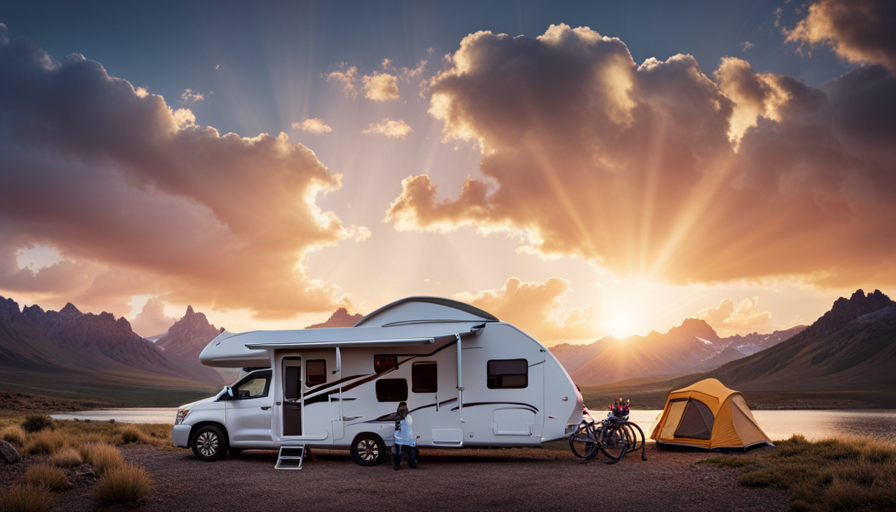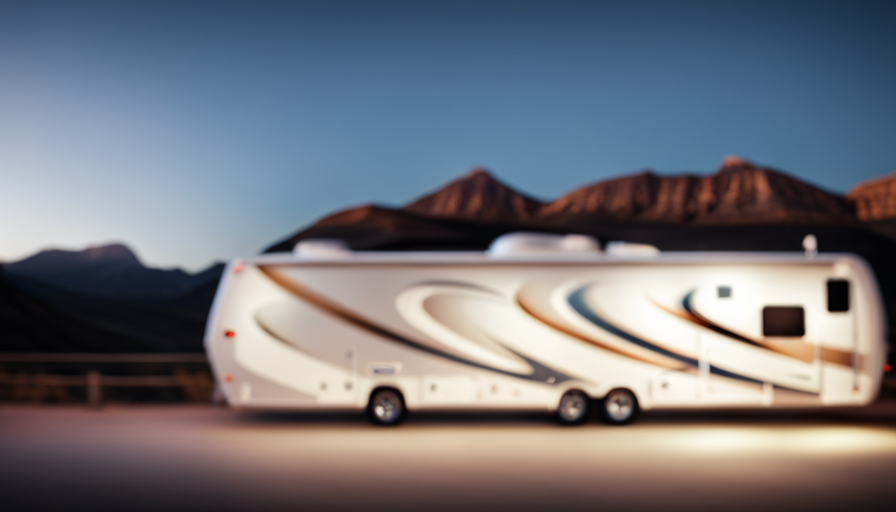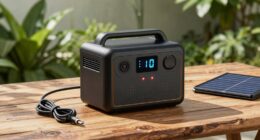Are ants invading your camper like a small army on a mission to conquer your space? Fear not, as I have the ideal plan to repel those pesky pests. With these effective techniques, you can reclaim your camper and enjoy an adventure free from bothersome bugs. Get ready to kick those ants to the curb and make the most of your outdoor experience.
From sealing off entry points to using ant repellent sprays and powders, I’ve got you covered. We’ll explore the importance of proper food storage and the wonders of natural ant deterrents like vinegar and lemon juice. And if that’s not enough, I’ll even teach you how to create a chalk or baby powder barrier to stop those sneaky ants in their tracks.
Plus, I’ll share tips on keeping your camper dry and moisture-free, because ants love nothing more than a damp environment. So, buckle up and get ready to learn the secrets of ant-free camping!
Key Takeaways
- Sealing off entry points using caulk or weatherstripping.
- Using ant repellent sprays or powders to create a barrier that ants will avoid.
- Proper food storage in airtight containers and regular cleaning to prevent ants from accessing food.
- Maintaining a dry and moisture-free environment through proper ventilation, moisture-absorbing materials, and sealing leaks.
Clean and Declutter Your Camper Regularly
Make sure you’re regularly cleaning and decluttering your camper to create an environment that ants won’t find appealing. Ants are attracted to food particles and crumbs, so it’s crucial to keep your camper clean and tidy.
Start by sweeping and vacuuming the floors to remove any food remnants. Pay close attention to the kitchen area, where spills are more likely to occur. Wipe down countertops, tables, and other surfaces with a mild cleaning solution to eliminate any food residue. Additionally, consider using ant-repellent products, such as sprays or natural deterrents, to further discourage ants from entering your camper.
Organizing your camper can also help keep ants away. Store food in airtight containers to prevent ants from accessing it. Keep pantry items and snacks neatly organized, making it easier to spot any signs of ant activity. Regularly check your storage areas for any signs of ants, such as trails or nests. If you do come across ants, remove them promptly and clean the affected area thoroughly.
To seal off entry points, inspect your camper for any openings or gaps where ants can enter. Use caulk or weatherstripping to seal cracks around windows, doors, and vents. Check for any potential entry points around utility lines or pipes as well.
By regularly cleaning, organizing, and sealing off entry points, you can effectively keep ants out of your camper and enjoy your time without any unwanted guests.
Seal Off Entry Points
To effectively prevent ants from entering your camper, you’ll want to ensure that all potential entry points are properly sealed off. Ants are tiny creatures that can find their way into even the smallest cracks and crevices, so it’s important to take proactive measures to keep them out. Here are some sealing methods you can use to fortify your camper against ant invasions:
-
Weatherstripping: Install weatherstripping around doors, windows, and any other openings to create a tight seal that ants can’t penetrate.
-
Caulking: Use a high-quality silicone caulking to seal gaps or cracks in walls, floors, and ceilings. Pay special attention to areas where pipes or electrical wires enter the camper.
-
Mesh screens: Attach fine mesh screens to vents and openings to prevent ants from crawling inside.
By sealing off these common entry points, you’ll greatly reduce the chances of ants finding their way into your camper. However, it’s important to note that sealing alone may not always be enough, especially if there are existing ant colonies nearby.
In the subsequent section, we’ll explore the use of ant repellent sprays or powders to further deter ants from entering your camper.
Use Ant Repellent Sprays or Powders
Imagine a world where your camper is an ant-free sanctuary, thanks to the magical powers of ant repellent sprays or powders. These ant prevention techniques can help keep those pesky insects at bay, allowing you to enjoy your camping experience without the annoyance of ants crawling all over your belongings.
Ant repellent sprays or powders are an effective way to create a barrier that ants will avoid. When choosing a repellent, look for natural remedies for ants that are safe for use in enclosed spaces like your camper. These products often contain ingredients such as peppermint, cinnamon, or citrus, which ants find offensive. Simply spray or sprinkle the repellent around the entry points and potential ant trails, such as windows, doors, or cracks in the walls. The strong scent will deter ants from entering your camper.
Once you have sealed off entry points and used ant repellent sprays or powders, it’s time to set up ant traps or baits to eliminate any remaining ants.
Set Up Ant Traps or Baits
Once you’ve created a barrier with repellent, it’s time to lure those pesky intruders away with strategically placed traps or baits. Ant traps or baits are effective ant prevention methods that provide an alternative ant control solution.
These traps work by attracting ants with a tempting bait and then trapping them inside, preventing them from returning to the camper. When setting up ant traps or baits, it’s important to place them in areas where ants are commonly found. Look for trails, entry points, or areas where you’ve seen ant activity.
The traps should be positioned along these paths or near their entry points. Make sure to follow the instructions provided with the traps or baits for proper placement and usage. There are various types of ant traps or baits available in the market. Some use sweet baits to attract sugar-loving ants, while others use protein-based baits for ants that prefer protein-rich foods.
Choose the appropriate bait based on the type of ants you’re dealing with. Regularly check the traps or baits and replace them if necessary, especially if they become full or if the bait loses its effectiveness. It’s important to remember that while traps or baits can be effective in controlling ant populations, they aren’t a standalone solution. Proper sanitation and other ant prevention methods should also be implemented.
In the next section, we’ll discuss how to store food properly to further prevent ants from entering your camper.
Store Food Properly
Make sure you store your food properly, or else you might find yourself sharing a meal with some unwanted guests, don’t you agree?
Proper food storage is crucial in keeping ants out of your camper. Here are some effective techniques to ensure your food stays ant-free:
-
Sealable containers: Store your food in airtight containers to prevent ants from accessing it. This will also help maintain the freshness of your food.
-
Elevated storage: Keep your food off the ground by using shelves or elevated storage cabinets. Ants are less likely to climb up and reach your food if it’s not easily accessible.
-
Clean surfaces: Wipe down all surfaces and countertops with a mixture of vinegar and water to remove any food debris or scents that may attract ants. This will help deter them from entering your camper.
Effective cleaning techniques are also essential in ant prevention. Regularly clean your camper using a mild detergent to remove any food residue or spills. Pay close attention to the kitchen area and dining table where crumbs are more likely to accumulate.
By storing your food properly and maintaining a clean camper, you can greatly reduce the chances of ants finding their way in. Now, let’s move on to the next section about removing trash and food waste immediately.
Remove Trash and Food Waste Immediately
After ensuring that food is stored properly, the next step in keeping ants out of your camper is to remove trash and food waste immediately. This is an essential aspect of ant prevention as it eliminates any potential food sources that may attract these pesky insects.
To effectively remove trash and food waste, it’s important to establish a regular cleaning routine. This includes disposing of any leftover food, emptying trash bins, and wiping down surfaces where food is prepared or consumed. Be thorough in your cleaning efforts, paying close attention to hidden areas where crumbs or spills may accumulate.
Additionally, be mindful of any outdoor trash bins or compost piles near your camper. These can also attract ants and should be properly maintained and sealed.
Preventive measures such as cleaning up spills promptly and using trash bags with tight seals can greatly reduce the likelihood of ants being attracted to your camper. By taking these cleaning tips into consideration, you can create an environment that’s less appealing to ants and decrease the chances of an infestation.
In the subsequent section, we’ll discuss the use of natural ant deterrents, such as vinegar or lemon juice, to further enhance your ant prevention efforts.
Use Natural Ant Deterrents, such as Vinegar or Lemon Juice
To enhance your defense against these pesky insects, try using natural ant deterrents like vinegar or lemon juice. These simple and readily available household items can effectively repel ants from your camper.
Here are three ways you can use vinegar or lemon juice to keep ants at bay:
-
Dilute vinegar or lemon juice with water in a spray bottle and spray it around entry points, such as windows, doors, and vents. Ants dislike the strong scent of these liquids, deterring them from entering your camper.
-
Soak cotton balls in undiluted vinegar or lemon juice and place them strategically near ant trails or areas where ants are commonly found. The strong odor will repel ants and discourage them from venturing further into your living space.
-
Wipe down surfaces in your camper with a mixture of vinegar or lemon juice and water. This not only cleans the area but also leaves behind a scent that ants dislike, making your camper less attractive to them.
If vinegar or lemon juice is not readily available, there are other natural ant deterrents you can consider, such as peppermint oil or cinnamon powder. These alternatives also have strong scents that ants find unpleasant.
To further fortify your defenses, let’s explore the next step: creating a barrier with chalk or baby powder.
Create a Barrier with Chalk or Baby Powder
To continue our discussion on natural ant deterrents, let’s explore another effective option: creating a barrier with chalk or baby powder. This method works by creating a physical barrier that ants are reluctant to cross.
Chalk and baby powder are readily available and easy to use. Simply draw a line or sprinkle a generous amount of chalk or baby powder around the perimeter of your camper, focusing on entry points such as windows, doors, and vents. The fine particles of these substances act as a deterrent, preventing ants from entering your living space.
But how effective are chalk and baby powder as ant deterrents in campers? To answer this question, let’s take a look at the following table:
| Chalk | Baby Powder | |
|---|---|---|
| 1 | Creates a visible barrier | Creates a visible barrier |
| 2 | Non-toxic | Non-toxic |
| 3 | Cost-effective | Cost-effective |
| 4 | Easy to apply | Easy to apply |
| 5 | May need reapplication | May need reapplication |
As you can see, both chalk and baby powder offer similar benefits and drawbacks when it comes to keeping ants at bay. However, it’s important to note that these methods may require occasional reapplication, especially in areas with high humidity or heavy foot traffic.
Now that we’ve discussed alternative barrier options, let’s move on to the next step in keeping your camper ant-free – keeping it dry and moisture-free.
Keep Your Camper Dry and Moisture-Free
Maintaining a dry and moisture-free environment in your camper is crucial to preventing unwanted insect visitors. Studies show that excess moisture can attract pests. To prevent condensation buildup, there are several steps you can take:
-
Proper ventilation: Ensure that your camper has adequate ventilation to allow for air circulation and prevent moisture buildup. This can be achieved by opening windows and using roof vents.
-
Use moisture-absorbing materials: Place moisture-absorbing materials, such as silica gel packets or activated charcoal, in areas prone to moisture, like closets or cabinets.
-
Seal any leaks: Inspect your camper for any leaks and seal them promptly. Leaks can lead to moisture buildup, attracting ants and other pests.
-
Install dehumidifiers: Consider installing dehumidifiers in your camper to regulate humidity levels and prevent excess moisture.
-
Remove sources of moisture: Keep your camper clean and dry by promptly wiping up any spills or leaks. Additionally, avoid drying wet clothes or towels inside the camper.
By following these steps, you can create a dry and moisture-free environment that will help keep ants and other insects at bay. However, if the problem persists, it may be necessary to seek professional help.
Seek Professional Help if the Problem Persists
If the problem persists, don’t hesitate to call in the professionals to ensure your camper remains an insect-free oasis. Seeking professional advice is crucial when dealing with persistent ant infestations. These experts have the knowledge and experience to identify the root cause of the problem and provide long-term solutions.
When it comes to ants, DIY methods may work temporarily, but they often fail to address the underlying issue. Professionals, on the other hand, can conduct a thorough inspection of your camper to identify potential entry points and nesting sites. They will then develop a customized treatment plan to eliminate the infestation and prevent future outbreaks.
Professional pest control companies have access to specialized products and techniques that are more effective in eradicating ants from your camper. These treatments are not only targeted towards eliminating existing ants but also disrupt their pheromone trails, making it harder for them to return.
Moreover, seeking professional help ensures the safety of your camper and your family. Pest control experts are trained in the proper handling and application of insecticides, minimizing the risk of exposure to harmful chemicals.
By seeking professional advice and implementing their recommended long-term solutions, you can enjoy a camper that is free from ants and other pesky insects. Don’t let a persistent ant problem ruin your camping experience; let the professionals take care of it so you can have peace of mind on your next adventure.
Frequently Asked Questions
How do I clean and declutter my camper regularly?
Cleaning and decluttering my camper regularly is essential to maintaining a tidy and organized living space. To tackle this task effectively, I follow some cleaning tips and organizing strategies.
Firstly, I start by creating a checklist of areas to clean, including surfaces, appliances, and storage compartments. Then, I utilize alliteration, such as "sweeping away the dust" and "sorting and storing supplies," to emphasize the importance of these tasks.
By staying on top of cleaning and organization, my camper remains a comfortable and enjoyable space.
What are some common entry points for ants in a camper?
Common signs of an ant infestation in a camper include the presence of ant trails, small piles of food crumbs, and the sight of live ants. To prevent ants from entering the camper, it’s crucial to seal off entry points. These can include gaps around windows and doors, cracks in the walls, and openings around utility lines. By properly sealing these areas with caulk or weatherstripping, you can effectively keep ants out of your camper.
Which ant repellent sprays or powders are most effective for keeping ants out of a camper?
The most effective ant repellent alternatives for keeping ants out of a camper are sprays and powders specifically designed to repel ants. These products contain active ingredients that deter ants from entering the camper.
Additionally, there are several DIY ant control methods that can be used, such as using vinegar, lemon juice, or cinnamon as natural ant repellents.
It’s important to regularly apply these repellents to potential entry points and areas where ants are commonly found.
How do I properly set up ant traps or baits in my camper?
To properly set up ant traps or baits in your camper, it’s crucial to understand the proper placement. According to a study by the University of California, the most effective placement for ant traps is along ant trails and near their entry points.
You can also try alternative methods such as using a mixture of borax and sugar as a homemade bait.
Remember to keep the traps clean and replace them regularly for maximum effectiveness.
What are some natural ant deterrents that I can use in my camper, such as vinegar or lemon juice?
To naturally deter ants from invading your camper, there are a few effective options you can use. One option is cinnamon, which acts as a barrier by disrupting their scent trails. This makes it difficult for ants to find their way inside. Another option is peppermint oil, which has a strong odor that repels ants and masks their scent trails. To use these deterrents, simply apply them around entry points and areas where ants are commonly seen. This will ensure a pleasant and ant-free camping experience.
What Measures Can I Take to Prevent Ants from Invading my Camper while Living in it?
Ants invading your living space can be a challenge, especially when you’re living full-time in a camper. To prevent their invasion, start by keeping your living area clean and free of food debris. Seal any cracks or openings that ants can crawl through, and store food in airtight containers. Additionally, consider using ant deterrents like cinnamon or vinegar around the perimeter of your camper. Stay proactive and take preventive measures to ensure a hassle-free experience while living full-time in a camper.
Conclusion
In conclusion, keeping ants out of your camper requires regular cleaning, sealing off entry points, and using ant repellents or traps. It’s also important to store food properly and use natural deterrents like vinegar or lemon juice. Create a barrier with chalk or baby powder. Additionally, keeping your camper dry and moisture-free is crucial in preventing ant infestations. Remember, "An ounce of prevention is worth a pound of cure." By taking these proactive measures, you can ensure a pest-free and enjoyable camping experience.










